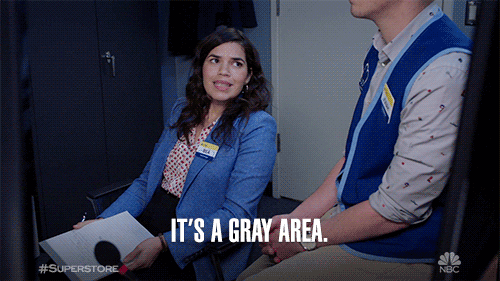Rethinking Personality Assessments
I want to make sure we begin with a trigger warning for discussions of mental health.
Allow me to get personal for a sec.
It was the beginning of 2022. I had been without a therapist for a few months because my previous therapist was too expensive - I know you can relate. My general practitioner had put in a referral for someone who was more affordable for me - let’s call him Dr. James.
My sessions would be 45 minutes, over the phone. We would begin with assessment of sorts - some questions to gauge where I was at. That first session would coincide with multiple major life events that would quite literally alter all I understood about life, death, and everything in between.
“How hopeless do you feel on a scale from 1 to 10, 10 being the most hopeless?”
My answer? 10. Oh boy…
“Have you lost interest in any activities that you’d normally enjoy?”
My answer? Yes. All of them, actually. Thank you for reminding me…
“Have you had trouble falling asleep, staying asleep, or sleeping too much?”
My answer? Yes. Again - to all of them. Ugh…
As I was listening to myself answer these questions, I kept thinking how my circumstances at this very time are directly impacting my answers to these questions. Surely, that can’t be a good barometer right now. I interrupted his questioning and said, “Ya know, Dr. James, I don’t think this is the best time to ask me these kinds of questions because I’m pretty deep in crisis mode.” He graciously agreed and we shelved those questions and focused on mitigating crisis.
Why am I sharing this? Dr. James was performing this assessment at a time where I was in an unusually heightened state. Because of the circumstances, my answers would not give him an accurate idea of the state of my mental health in general.
This assessment would actually indicate I was doing very poorly.
Now, at this point you might be wondering - what does this have to do with personality assessments in hiring? Just like my assessment with Dr. James was inherently biased due to being in crisis mode, personality assessments during the hiring process can introduce a LOT of bias and discrimination.
Let’s get riiiiight into it.
A Big Red Flag ⛳️
Personality assessments have a tendency to “lock out” people who are neurodivergent, particularly autistic folks. You might be thinking, “But how? Are there not discrimination laws to prevent this from happening?”. In the US, companies or organizations that employ more than 15 people are required to provide reasonable accommodations to both applicants and employees according to the Americans With Disabilities Act. The United Kingdom has similar laws in place to prevent discrimination.
A personality assessment is not explicitly bias or Red Flag Material per se, right? Well, the data a prospective employer can glean from personality assessments can be. Often, candidates are asked questions based on their character traits, personality, and whether or not they will fit in with the rest of the employees who are already working there. Sounds harmless enough?
According to one study in particular, “[r]esearch shows that if an employee is placed in a position that doesn’t match their personality traits, it often leads to lower engagement.”
Lower engagement.
Lower engagement is not the same as lower ability or lower skill.
For autistic folks, lower engagement is really just less small-talk and more direct communication. And, if we take it a step further, there’s often less interest in engaging with traditional social hierarchies.
Of course, not all autistic folks are the same, but many of us tend to think more literally. That often means we’re less concerned with climbing the corporate ladder or playing by unwritten social rules. Those norms just might not resonate with us — or feel worth following in the first place.
When hiring processes prioritize “fit” over skill, autistic candidates often get screened out — not for lack of talent, but for not performing in a neurotypical way.
A Distinct Grey Area
I wrote my first conditional statement in JavaScript in 2020. It was simple - but I was pretty jazzed! In programming, conditional statements are used to perform different actions based on different conditions. To put it simply, it’s a way of saying, “if this happens, then do that.”
Wouldn’t it be marvelous if things were that simple?
Or would it be infuriating because things are not that simple?
I’ll let you answer that for yourself 😉
Personality assessments tend to lack that grey area that should exist between the two questions I just posed. Sometimes, things might be marvelous if they were that simple. But sometimes, simplifying things too much leads to a lack of nuance.
There is a “grey area” in humans. We are not computers. We do not work like a conditional statement in a JavaScript program. Some things simply can’t be assessed as easily as we think they can be! Not to mention factoring in life events that change your perception. Just like my initial assessment with Dr. James, a person’s circumstances can affect outcomes.
The same is true of personality assessments. These assessments are distinctly lacking in clarity, nuance, and context. If the mode by which you are assessing is lacking, then your results will also be lacking.
Honestly...
Let’s be honest with ourselves - so many of us can’t be honest with ourselves 😅
No, really! It’s true! Humans are really bad as self-assessments. Like, comically bad!
Also, fun or not-so-fun-fact → we love to blame other people for our failures and ourselves for our successes.
Personality assessments are based on your perception of yourself - whether or not it skews positive or negative varies. Now, please don’t take this as me telling you that you are biased about yourself!
Science is saying it 😁.
What’s Do We Do Now?
Assessments are trying to simplify something that is not simple - being human. They skim over the nuance, the context, and the shifting nature of our minds and lives - especially for neurodivergent folks.
I can’t believe I’m going to say this in 2025 - but I think humans deserve more credit. We are adaptable. We surprise ourselves. We grow. We can bend with the circumstances around us - whether that’s a major life event or working in a new company. Trying to pin humans down with rigid assessments ends up saying more about the test than the person taking it.
Before you send your next batch of candidates a personality assessment, I’d ask you to reconsider.
Who is it really serving?
More importantly - who is it leaving out?



